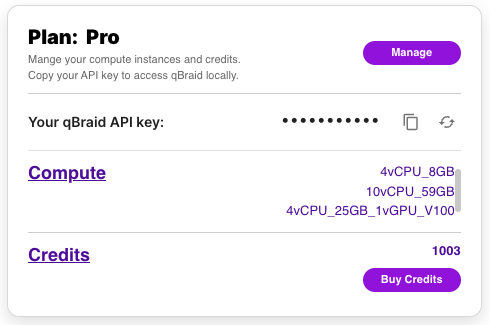JupyterLab extension for managing execution environments, packages, and kernels.
Project description
jupyter-environment-manager
JupyterLab extension for managing execution environments, packages, and kernels.
This extension is composed of a Python package named jupyter_environment_manager for the server extension and
an NPM package named @qbraid/jupyter-environment-manager for the frontend extension.
Installation & Setup
For the best experience, use the Environment Manager on lab.qbraid.com. Login (or create an account) and follow instructions in user guide to get started.
The Environment manager requires Python 3.9 or greater, and is compatible with JupyterLab 3.x.
Local Install
The Environment Manager can be installed using pip:
pip install jupyter-environment-manager
If your notebook version is < 5.3, you need to enable the extension manually:
jupyter serverextension enable --py jupyter_environment_manager --sys-prefix
jupyter nbextension install --py jupyter_environment_manager --sys-prefix
jupyter nbextension enable --py jupyter_environment_manager --sys-prefix
Local Setup
To use the Environment Manager locally, you must configure your qBraid account credentials:
- Create a qBraid account or log in to your existing account by visiting account.qbraid.com
- Copy your API Key token from the left side of your account page:
- Save your API key using the qbraid-cli:
pip install qbraid-cli
qbraid configure
The command above stores your credentials locally in a configuration file ~/.qbraid/qbraidrc,
where ~ corresponds to your home ($HOME) directory.
Alternatively, the Environment Manager can discover credentials from environment variables:
export QBRAID_API_KEY='QBRAID_API_KEY'
Community
- For feature requests and bug reports: Submit an issue
- For discussions, and specific questions about the Environment Manager, qBraid Lab, or other topics, join our discord community
- Want your open-source project featured as its own runtime environment on qBraid Lab? Fill out our New Environment Request Form
Launch on qBraid
The "Launch on qBraid" button (below) can be added to any public GitHub
repository. Clicking on it automaically opens qBraid Lab, and performs a
git clone of the project repo into your account's home directory. Copy the
code below, and replace YOUR-USERNAME and YOUR-REPOSITORY with your GitHub
info.
Use the badge in your project's README.md:
[<img src="https://qbraid-static.s3.amazonaws.com/logos/Launch_on_qBraid_white.png" width="150">](https://account.qbraid.com?gitHubUrl=https://github.com/YOUR-USERNAME/YOUR-REPOSITORY.git)
Use the badge in your project's README.rst:
.. image:: https://qbraid-static.s3.amazonaws.com/logos/Launch_on_qBraid_white.png
:target: https://account.qbraid.com?gitHubUrl=https://github.com/YOUR-USERNAME/YOUR-REPOSITORY.git
:width: 150px
Project details
Release history Release notifications | RSS feed
Download files
Download the file for your platform. If you're not sure which to choose, learn more about installing packages.
Source Distribution
Built Distribution
Hashes for jupyter_environment_manager-0.2.0.tar.gz
| Algorithm | Hash digest | |
|---|---|---|
| SHA256 | b205fb818fa01f463b0361b74e727ccd7137b6bc1ca5f772a4e35af95523dc5d |
|
| MD5 | 31071fb6b85ed686be98d35b8dac7915 |
|
| BLAKE2b-256 | 2b47fe10a51e61ab4892f502eeef7d8e8b7dd03e2cb4e1a41b2a228d205c748f |
Hashes for jupyter_environment_manager-0.2.0-py3-none-any.whl
| Algorithm | Hash digest | |
|---|---|---|
| SHA256 | 9f111609de422b8d7cfb40b248a7e4e13c31a0f525b39fa03a93b82368cbedfc |
|
| MD5 | b90c40977a0336a537df2a7a5083317e |
|
| BLAKE2b-256 | 10018444a0e44012f8c71b55156cecf5399ba76a755ceca07c79199876b04ced |


















